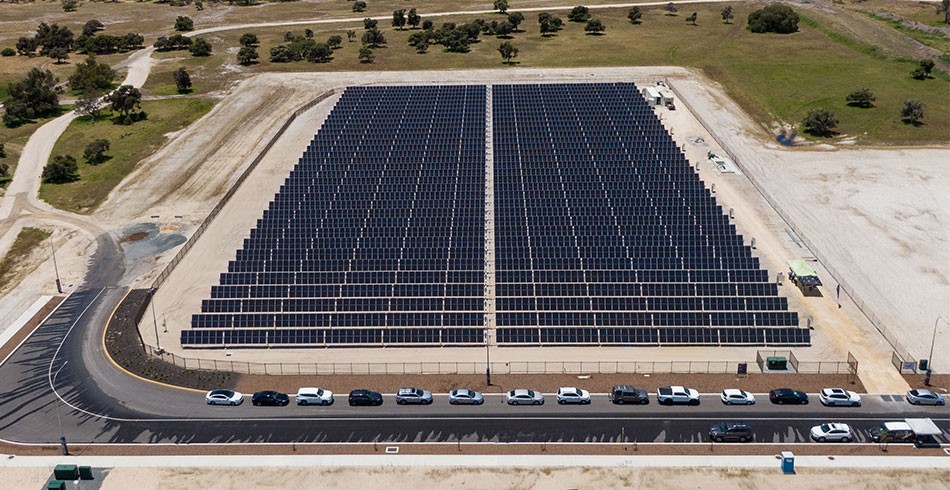Western Australia’s Peel Business Park is powering over 50 per cent of its site through a solar, battery and microgrid solution.
Working with owner/operator client Peel Renewable Energy, FIMER developed a customised solar, battery and microgrid solution to supply power to the Peel Business Park in Nambeelup, Western Australia. Fully integrated and commissioned in March 2021, it is the first-ever renewable energy microgrid in Australia to power an industrial estate. The energy solution will deliver safe, reliable and green energy to the tenants of the estate at an expected energy cost savings of around 30 per cent compared to published tariffs in Western Australia.
The Peel Business Park is a multi-staged 1,000ha greenfield industrial estate being developed in Nambeelup (approximately 70km south of Perth). DevelopmentWA (the state government’s land developer) has activated the first phase of the Peel Business Park, with Stage 1 lots released in 2020.
Due to the remoteness of this new industrial development area, an existing power connection to the traditional grid did not exist, and it was not economically feasible to construct and extend a new full-supply grid connection to the site. An onsite, behind the meter solar and battery solution was highlighted as the most cost-effective, reliable and green alternative to a traditional servicing approach. By utilising a smart renewables microgrid solution, the business park will instead use locally generated renewable energy directly from an onsite solar farm, along with a battery energy storage system, to power over 50 per cent of the site.
Related article: Microgrid technology powers WA town with 100% renewables
Peel Renewable Energy was appointed by DevelopmentWA through an open tender process in October 2019 to deliver, manage and service the energy solution for the Peel Business Park.
Avora Energy, a privately owned Western Australian engineering, procurement and construction company, was engaged by Peel Renewable Energy to design, procure, construct and commission the solar and battery solution. Sunrise Energy Group, an expert in behind the meter renewable solutions, was a technical and project management partner to the project. Jarrah Solutions provided protection, SCADA and comms schemes for the project, including the microgrid control system.
The renewable energy solution includes a 1.2 MW solar farm, incorporating over 2772 bi-facial 440W panels with a NEXTracker single-axis tracking system, a FIMER skid mounted solar & battery inverter system with medium voltage power distribution system and a 2.5 MWh Saft battery energy storage system.
Avora Energy managing director Jeff Brill said, “During the product component selection process, we were looking for a combined inverter and battery solution that would elegantly meet all the technical and project requirements. FIMER’s PV & battery solution was a fully integrated solution that could be delivered on a single skid that ensured easy installation, commissioning and servicing.”
The FIMER solution was designed specifically for this project. With over 12 months of planning across multiple teams in Australia and Europe, the customised 40” skid incorporates:
- FIMER PVS980-58 central inverter
- FIMER bi-directional inverter, the PVS980-58BC, including grid-forming-ready technology
- hybrid medium-voltage transformer
- associated switchgear.
FIMER Australia utility-scale solar manager Aaron Zadeh said, “We are extremely excited to have been part of this ground-breaking solution with Peel Renewable Energy, Avora Energy, Sunrise Energy Group, Jarrah Solutions and DevelopmentWA. FIMER custom designed and manufactured this solution for the project. It’s a unique ‘hybrid inverter station’ that hosts both a solar inverter and battery converter on a single medium voltage station. It uses FIMER’s PVS980 technology and offers a range of benefits to Peel Business Park tenants.”
“FIMER’s technology can shape how small utility-scale microgrids can thrive in Australia moving forward.”
Utilising the hybrid station with both FIMER inverters enables the technology to share a portion of hardware that brings significant synergies over the system’s life, from a faster installation, higher reliability, and a rapid return on investment as well as long-term support and maintenance benefits.
The 1.2MW solar farm is serviced by the FIMER PVS-980-58 solar PV inverter, which provides high efficiency, low auxiliary power consumption, innovative air cooling and is designed for outdoor applications.
Related article: World’s biggest renewables hub planned for WA
The FIMER PVS-980-58BC, a bi-directional inverter, will service the 2.5MWh energy storage solution and will convert, store and discharge excess power from the battery solution in periods of high demand.
The battery system installed and commissioned on the site is a 2.5MWh Saft solution with a 1.2MW power rating. Saft’s containerised lithium-ion batteries are equipped with sophisticated temperature management, safety equipment and cloud-enabled controls.
Saft market leader for energy storage solutions Michael Lippert said, “Our batteries are built with advanced Li-ion technology, which has been proven to provide high efficiency, long-life energy storage for microgrids in harsh environments and under very dynamic charge/discharge operation patterns.”
“We were able to deliver our 2.5MWh ‘plug-and-play’ battery solution on time and being easily integrated with FIMER’s solution, facilitated fast installation and commissioning.”
The solar generation and battery energy storage solution has an expected annual output of over 3GWh and will reduce CO2 emissions by approximately 2,100 tonnes per annum.







